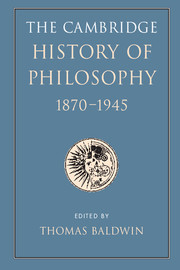Book contents
- Frontmatter
- Contents
- List of contributors
- Introduction
- I 1870–1914
- 1 Positivism, Idealism, and Pragmatism
- 2 Psychology and Philosophy
- 3 Logic, mathematics, and judgement
- 4 Philosophy and the new physics
- 5 The idea of social science
- 15 The debate over the Geisteswissenschaften in German philosophy
- 16 From political economy to positive economics
- 17 Sociology and the idea of social science
- 6 Ethics, politics, and legal theory
- 7 Philosophy of religion and art
- Interlude
- II 1914–1945
- Biobibliographical appendix
- Bibliography
- INDEX
- References
16 - From political economy to positive economics
from 5 - The idea of social science
Published online by Cambridge University Press: 28 March 2008
- Frontmatter
- Contents
- List of contributors
- Introduction
- I 1870–1914
- 1 Positivism, Idealism, and Pragmatism
- 2 Psychology and Philosophy
- 3 Logic, mathematics, and judgement
- 4 Philosophy and the new physics
- 5 The idea of social science
- 15 The debate over the Geisteswissenschaften in German philosophy
- 16 From political economy to positive economics
- 17 Sociology and the idea of social science
- 6 Ethics, politics, and legal theory
- 7 Philosophy of religion and art
- Interlude
- II 1914–1945
- Biobibliographical appendix
- Bibliography
- INDEX
- References
Summary
INTRODUCTION
Although discourses on the subject of wealth and money reach back to antiquity, extensive theorising about economic phenomena only emerged in the seventeenth and eighteenth centuries. Adam Smith’s Wealth of Nations (1776) launched the classical theory of political economy which was developed in the nineteenth century, most notably by Jean-Baptiste Say, Thomas Robert Malthus, David Ricardo, and John Stuart Mill. Despite numerous differences, they were of one mind on the significance of labour in determining value and prices, on the perpetual strife between landowners, capitalists, and labourers, and on the inevitable onset of the ‘stationary state’ due to a tendency of the profit-rate to decline. Notwithstanding the fact that the British economy had grown at an unprecedented rate since the mid-eighteenth century, nineteenth-century economists were preoccupied with the problems of scarcity of land and capital, coupled with an overabundant population.
By the 1820s, it was commonplace in learned circles to refer to political economy as a science. It had an extensive list of laws and, in the hands of Ricardo, had gained a deductive rigour that was often compared to Euclidean geometry. Nevertheless, political economy was almost entirely a literary pursuit. Ricardo used hypothetical numerical examples to illustrate his principles, but he did not posit algebraic functions or undertake quantitative verifications of his derivations. The basic assumptions about human behaviour were also left rather vague, though it could be argued that, with the immediate ancestry of Hume and Smith, classical political economy was actually founded upon a rich set of insights into human nature.
- Type
- Chapter
- Information
- The Cambridge History of Philosophy 1870–1945 , pp. 235 - 244Publisher: Cambridge University PressPrint publication year: 2003
References
- 1
- Cited by

